








Airlines, Airports and Airliners News -1 to 7 June THE INTERNATIONAL AIR TRANSPORT ASSOCIATION (IATA) ANNOUNCED THAT DEMAND FOR AIR SERVICES IS BEGINNING TO RECOVER  More recently, figures show that daily flight totals rose 30% between the low point on 21 April and 27 May. This is primarily in domestic operations and off of a very low base (5.7% of 2019 demand). While this uptick is not significant to the global dimension of the air transport industry, it does suggest that the industry has seen the bottom of the crisis, provided there is no recurrence. In addition, it is the very first signal of aviation beginning the likely long process of re-establishing connectivity. "April was a disaster for aviation as air travel almost entirely stopped. But April may also represent the nadir of the crisis. Flight numbers are increasing. Countries are beginning to lift mobility restrictions. And business confidence is showing improvement in key markets such as China, Germany, and the US. These are positive signs as we start to rebuild the industry from a stand-still. The initial green shoots will take time-possibly years-to mature," said Alexandre de Juniac, IATA's Director General and CEO. IATA calculated that by the first week of April, governments in 75% of the markets tracked by IATA completely banned entry, while an additional 19% had limited travel restrictions or compulsory quarantine requirements for international arrivals. The initial flight increases have been concentrated in domestic markets. Data from late May show that flight levels in Republic of Korea, China and Vietnam have risen to a point now just 22-28% lower than a year earlier . Searches for air travel on Google also were up 25% by the end of May compared to the April low, although that's a rise from a very low base and still 60% lower than at the start of the year. APRIL 2020 (% YEAR-ON-YEAR) WORLD SHARE1 RPK ASK PLF (%-PT)2 PLF (LEVEL)3 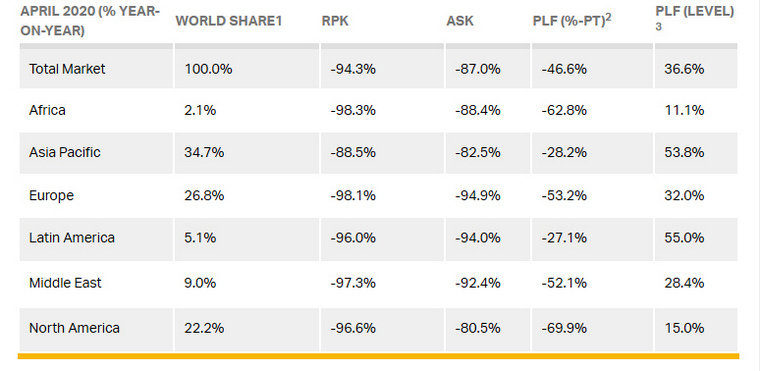 International Passenger Markets Asia-Pacific airlines' April traffic plummeted 98.0% compared to the year-ago period, worsened from a 70.2% drop in March. Capacity fell 94.9% and load factors shrank 49.9 percentage points to 31.3%. European carriers' April demand toppled 99.0%, a sharp decline from the 53.8% decline in March. Capacity dropped 97% and load factors shrank by 58 percentage points to 27.7%. Middle Eastern airlines posted a 97.3% traffic contraction for April, compared with a 50.3% demand drop in March. Capacity collapsed 92.3% and load factors crumbled to 27.9%, down 52.9 percentage points compared to the year ago period. North American carriers had a 98.3% traffic decline in April widened from a 54.7% decline in March. Capacity fell 94.4% and load factors dropped 57.2 percentage points to 25.7%. Latin American airlines experienced a 98.3% demand drop in April compared to the same month last year, from a 45.9% drop in March. Capacity fell 97.0% and load factors fell 34.5 percentage points to 48.1%, highest among the regions. African airlines' traffic sank 98.7% in April, nearly twice as bad as the 49.8% demand drop in March. Capacity contracted 87.7%, and load factors dived 65.3 percentage points to just 7.7% of seats filled, lowest among regions. MARCH 2020 (% YEAR-ON-YEAR) WORLD SHARE1 RPK ASK PLF (%-PT)2 PLF (LEVEL)3 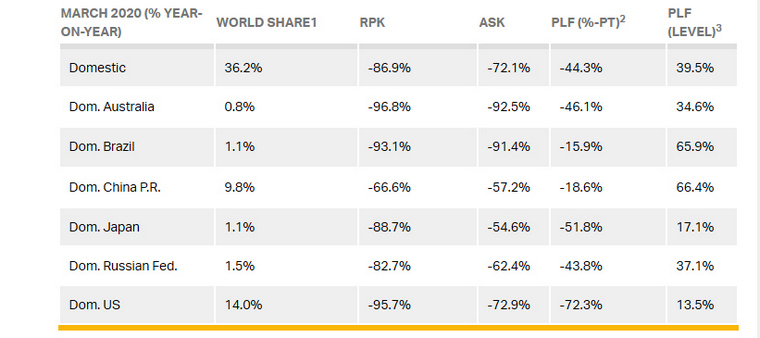 Russian airlines' domestic traffic fell 82.7% in April compared to April 2019. The slower shrinkage compared to the other markets is attributable to the later timing of the outbreaks in the country. The Bottom Line The ICAO Council's "Take-off: Guidance for Air Travel through the COVID-19 Public Health Crisis" is the authoritative and comprehensive framework of risk-based temporary measures for air transport operations during the COVID-19 crisis. These were developed through broad-based consultations with governments, the World Health Organization and with key advice from aviation industry groups including IATA, Airports Council International (ACI World), the Civil Air Navigation Services Organization (CANSO) and the International Coordinating Council of Aerospace Industries Associations (ICCAIA). "We fully support its recommendations and look forward to working with governments for a well-coordinated implementation. The world cannot afford to delay," said de Juniac AIRLINK TO RESUME DOMESTIC FLIGHTS WITH NEW TRUNK ROUTE SERVICES This follows the implementation of South Africa's COVID-19 "Level 3" restrictions, which permits a three-phase resumption of domestic flights, based on the following: Phase 1, which came into effect this morning and permits flights between Johannesburg, Cape Town and Durban. Phase 2 will see some of the inland airports brought on-stream once the system has been stress-tested and proven. Phase 3 will enable services to the other coastal and inland cities.  This initial introductory schedule will be augmented with additional frequencies as from 15th June. Ticket Sales Tickets are on sale at IATA-registered travel agents or online: www.flyairlink.com The Airlink call centre is open to address any queries. It can be reached on: Tel: +27 11 451 7300 during office hours, Mondays to Fridays. Health & Biosecurity The safety and well-being of our passengers, employees and aircraft are our top priority and we would like our customers and crew members to fly with confidence. Our aircraft are equipped with High Efficiency Particulate Air filters, like those used in hospital operating theatres, which are effective at blocking 99.97% of particulates, including Coronavirus molecules. These filters help to continually sterilise the air in our cabins, which is renewed entirely every three minutes. Together with the Airports Company South Africa, we are implementing all of the necessary effective sanitisation and distancing measures to stop the transmission of the COVID-19 virus while travelling on an Airlink flight. While we are doing everything, we can to provide a safe and bio-secure environment, this system is only effective if travellers, airline and airport personnel practice good personal hygiene and social distancing etiquette, i.e: Wearing face masks or coverings at all times in the airport and onboard our planes, frequently sanitising or washing hands with soap and water, avoid touching mouths, noses, eyes and other people and not travelling if feeling unwell. FLY SAFAIR, WE ARE CLEARED FOR TAKEOFF 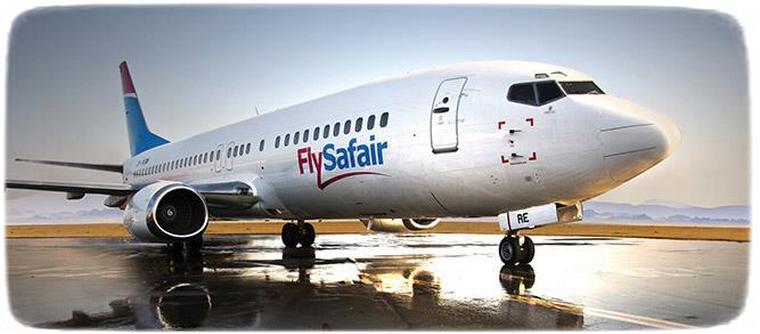 We'd like to thank you for the patience you've had while we've been unable to operate and for all the messages of support that you've shared with us on social media and other platforms. These have meant so much to everyone at FlySafair. Flight operations will start on 15 June 2020 and we will be publishing flights for sale and our schedules early this week. We'll send out another email once all flights are available for sale. • You may only fly for business and a permit declaring that your travel is for business reasons is required. More information on how to go about getting a permit is available here. • Flights are only allowed between Johannesburg, Cape Town and Durban. • Strict safety protocols have to be adhered to during travel. • Due to safety screenings, travellers should plan for delays in accessing the terminal building. Please arrive well before your flight to avoid missed departures. Our customer contact centre will open on Monday, 8 June 2020 and we'll be ready to field any questions you have, including those about vouchers, refunds to cash, safety measures and flight availability. Our teams are excited about being able to assist you again. We've been designing a safe travel experience for flights during the pandemic since before the lockdown even started. There are a number of measures that we've put in place that meet, and exceed, the legislated regulations. Click here to read more about the FlySafair Pledge which outlines the details of the measures we're taking. But as a quick overview, you can expect the following: • Screening of all staff and passengers. • Compulsory wearing of masks throughout flight. • Self-scanning of documents, no catering and no magazines to avoid contact. • Sterile aircraft cabins, re-sterilised between flights. • Reduced passenger movement during flight. • Staggered boarding procedures. Regulations have placed no limits on the capacity on an aircraft for the purposes of social distancing, thanks to sophisticated air filtration systems onboard and the combination of other protective measures we are implementing. Research has indicated that blocking out middle seats doesn't significantly improve protection against viral transmission. That said, we respect that many of our passengers would prefer the option of a blocked middle seat for their own peace of mind. As part of our ongoing promise of safety and innovation, customers may block the middle seat in their row when making reservations on our website for an additional fee to your booking. We are the only airline in South Africa that offers this facility. COMAIR'S BUSINESS RESCUE PRACTITIONERS OUTLINE PLAN 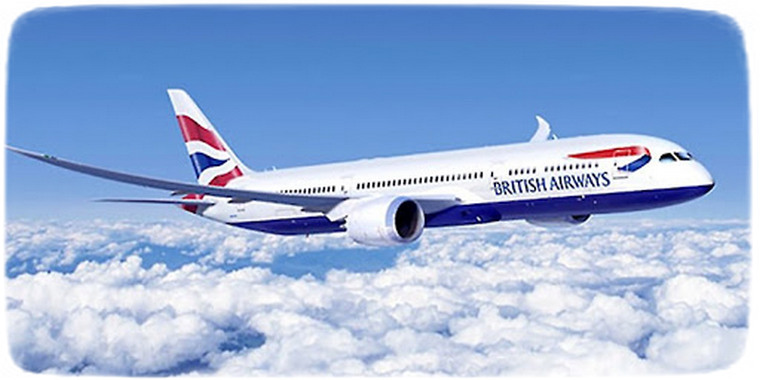 The aircraft are currently in a preservation programme to ensure that they are ready to fly again, the resumption of operations now, would however require securing fuel suppliers and covering numerous other costs which the airline would not be able to meet without a significant cash injection. The business rescue practitioners confirmed they were in discussions with funders to recapitalise the airline in order to resume domestic passenger operations by 1 November. Over 30 potential funders had been contacted and six are progressing discussions. To ensure the future sustainability of the airline, Comair had acquired Infinea's 50% shareholding of Nacelle. The negotiations began before Comair entered business rescue and the deal will give it full control of IT infrastructure, customer data, flight systems and support services. Comair is not able to fund the deal now. It has agreed to pay in instalments over 17 months once funding has been secured. The practitioners said the proposed business rescue plan would include the rationalisation of the current fleet from 27 aircraft, including the grounded Boeing 737 MAX8, to 13 737-800s and three spare 737-400s. The business rescue practitioners had consulted extensively, both in South Africa and abroad and it was considered that a downsized fleet would be more in keeping with what the company could afford to operate and demand for air travel post the Covid-19 crisis. Shaun Collyer, one of the business rescue practitioners, said that employees had been placed on unpaid leave and retrenchment proceedings are continuing under the auspices of the CCMA. "This unfortunate hardship has been imposed on Comair employees as a consequence of the Covid-19 lockdown and State-of-Disaster Act." Comair would focus on its airline business. Creditors would be paid according to the probable liquidation dividend determined in accordance with the provisions of the Companies Act through: The sale of non-core assets; Any equity capital raised and/ or; The issuing of shares. The target date for this is 31 October 2020. In terms of the restructuring plan, it is likely that the existing shareholder base will be substantially diluted. The business rescue practitioners intend to have substantially implemented the plan by 31 March 2021, at which point the company will be handed back to the board of directors and management. SEVENTY-TWO AIRPORTS REOPENING AS AIRPORT INDUSTRY RESTART AND RECOVERY 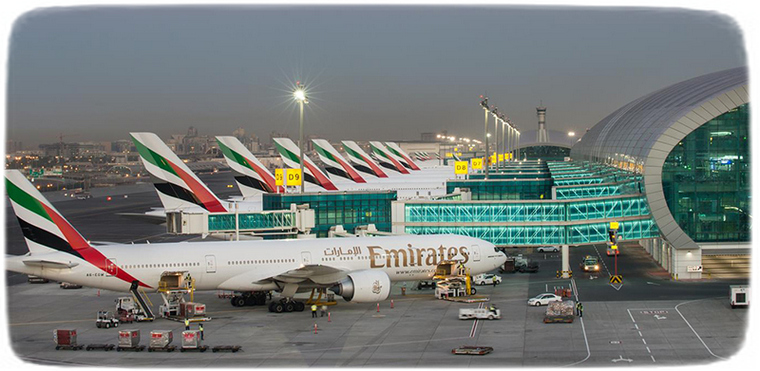 The Airports Council International (ACI) World, meanwhile, has published a comprehensive guidance for airports as they prepare to restart operations to assist them in sustaining a business recovery in the midst of the COVID-19 pandemic. The COVID-19 pandemic has caused a systemic crisis resulting in unprecedented disruption to global air transport. ACI World estimates that, in 2020, airports will suffer a reduction of more than 4.6 billion passengers and decline in revenue of more than $97 billion U.S. The UN specialized agency International Civil Aviation Organization (ICAO) said the following airports are scheduled to reopen between June to August-Lebanon, Bahrain, Qatar, Jordan, Iraq, Iran, Egypt, Saudi Arabia, Tunisia, Baghdad, Japan, Northern Macedonia, Lithuania, Hungary, Poland, Romania, Serbia, Netherlands, Kazakhstan, Albania, Bosnia & Herzegovina, Denmark, Estonia, Finland, South Korea, Ireland, Kyrgyzstan, Latvia, Norway, Slovakia, Australia, Belarus, Belgium, China, Sweden, Canada, Colombia, Kosovo, Malaysia, Moldova, Uzbekistan, Republic of Taiwan, Turkmenistan, Uzbekistan, Taiwan, Ukraine, Indonesia, India, Pakistan, Algeria, Morocco, Philippines, South Africa, Georgia, UK, Kuwait, Libya, Cyprus, Russia, Bulgaria, Brazil, Armenia, France, Greece, Germany, Spain, Italy, Italy, Austria, Azerbaijan, Czech Republic, USA, Switzerland, and UAE. ACI says its publication Aviation Operations during COVID-19: Business Restart and Recovery provides best practice examples and guidance for the industry to restart and recover for what is now the "new normal" after the pandemic. ACI World expects the return to business for the aviation industry to come in phases: initial restart with a limited number of passengers, recovery with a slow increase in passenger volume, gradual scale-up in capacity and then return to more traditional passenger volumes. Any new measures that are introduced at airports will need to evolve through these phases until, eventually, the industry will arrive at "the new normal" in terms of the end-to-end passenger journey. "COVID-19 has been an unprecedented global challenge, particularly to the aviation industry, with the quick spread of the virus resulting in governments rapidly restricting travel and closing borders to limit the spread," ACI World Director General Angela Gittens said. "This has had a drastic and detrimental effect on airports worldwide and a variety of new measures could become a necessity at airports as the industry restarts. "For airports, the focus is to protect the health and welfare of travellers, staff and the public, to minimize the opportunities for dissemination of disease while maintaining efficient operations." Airports are not expected to use all the options provided in the document but it gives advice on implementing best-practice measures that might be appropriate, depending on local circumstances. In the implementation of measures, the guidance urges, there should be coordination between governments, clear definition of responsibilities and good communication to the travelling public. As well, it may be necessary to accelerate needed regulatory change. BOEING RESUMES 737 MAX PRODUCTION 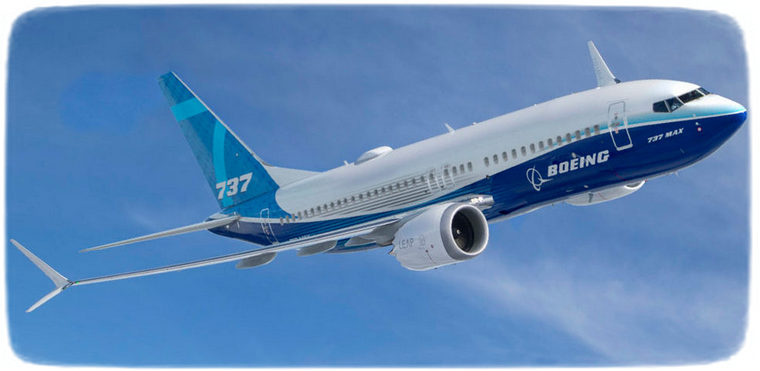 "We've been on a continuous journey to evolve our production system and make it even stronger," said Walt Odisho, vice president and general manager of the 737 program. "These initiatives are the next step in creating the optimal build environment for the 737 MAX." During the temporary suspension of production that began in January, mechanics and engineers collaborated to refine and standardize work packages in each position of the factory. New kitting processes will also ensure that employees have everything they need at their fingertips to build the airplane. "The steps we've taken in the factory will help drive our goal of 100 percent quality for our customers while supporting our ongoing commitment to workplace safety," said Scott Stocker, vice president of 737 Manufacturing. The 737 program will gradually ramp up production this year. LUXAVIATION GROUP ACQUIRES VIP TERMINAL AT PARIS-LE BOURGET 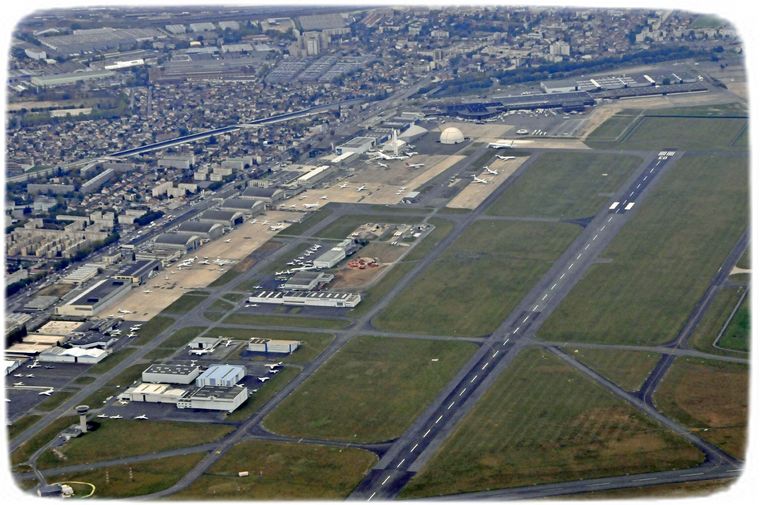 Patrick Hansen, CEO of Luxaviation Group says: "With the acquisition of the prestigious Paris-Le Bourget VIP Terminal, we are able to further grow our 26 strong VIP Terminal network under our ExecuJet Brand, and provide our clients with an unrivalled full-service ground handling in an unparalleled location. We continue to focus on our core aviation services and further concentrate on innovation and expansion. As a group, we are determined to drive the curve and to invest worldwide into the sector's development." In 2019, Sky Valet Paris- Le Bourget has managed over 6000 business aircraft movements representing 12% market share. Sky Valet is a brand owned and managed by Aéroports de la Côte d'Azur. In France, the brand operated in Cannes, St Tropez and Paris-Le Bourget. ACA manages 22 FBOs in France, Spain and Portugal, and additional 7 independents locations through its marketing and sales partnership Sky Valet Connect. Sky Valet Paris- Le Bourget manages its own terminal with secured car parking, and dedicated security filter and ramp area. Dominique Thillaud, President of the Board of Aéroports de la Côte d'Azur: "After five years of continuous growth and having achieved a market share of 12%, we are pleased with the finalization of this sale contract to Luxaviation Group which will extend the efforts and good results Sky Valet Paris- Le Bourget. The dynamism of this VIP Terminal at one of Europe's leading business airport can only contribute to the dynamism of our remaining FBO activities, in France and in Europe". Karol Gueremy, CEO of Luxaviation France and Portugal says:" We are looking forward to welcoming the 15 experienced colleagues of Sky Valet France in our Luxaviation team in Paris. Their recognized excellence matches the high-level service spirit of Luxaviation throughout the Group and increases our service offering". Karol Gueremy will be supervising the team of this newly acquired VIP terminal in Paris. Paris-Le Bourget airport is rated number one of Europe's Top 20 business airports in terms of aircraft movements. In 2019 Europe's leading business aviation airport registered a total of 25.000 departures compared to the second most important business airport in Nice Geneva, which accounts for 17.000 departures. EMIRATES RESUMES PASSENGER FLIGHTS TO 9 DESTINATIONS, INCLUDING CONNECTIONS BETWEEN UK AND AUSTRALIA  These flights will be available for booking on emirates.com. Travellers will only be accepted on these flights if they comply with the eligibility and entry criteria requirements of their destination countries. This includes an approval from the Federal Authority for Identity and Citizenship (ICA) for UAE residents who wish to return to Dubai. Health and safety on Emirates The safety and wellbeing of passengers and employees is Emirates' top priority. In preparation for the resumption of flight services, the airline has already enhanced various precautionary measures throughout the customer journey. At Dubai International airport, customers and employees will have their temperatures checked via thermal scanners. Protective barriers have been installed at check-in counters to provide additional safety during interaction. Gloves and masks are mandatory for all customers and employees at the airport. In addition, Emirates' cabin crew, boarding agents and ground staff who interact directly with travellers will don personal protective equipment (PPE) including a protective disposable gown and safety visor. Social distancing protocols will also be implemented. At this airport, this includes physical indicators being placed on the ground and at waiting areas in the airport to ensure travellers maintain a safe distance. For health and safety reasons and to minimise interaction on-board, Emirates will offer a modified in-flight service that focuses on reducing contact and infection risk. Magazines and print reading material will not be available during this time. Cabin baggage have to be checked-in and customers can only bring essential items such as a laptop, handbag, briefcase or baby items on board. Emirates has initiated a stringent safety programme to ensure aircraft cabins remain clean and sanitary. The airline's modern aircraft cabins have been fitted with advanced HEPA air filters which remove 99.97% of viruses and eliminate dust, allergens and germs from cabin air for a healthier and safer on-board environment. After its journey and on landing in Dubai, each aircraft will go through enhanced cleaning and disinfection processes to ensure safety and proper sanitation. AIR NEW ZEALAND LOUNGES TO OPEN TODAY 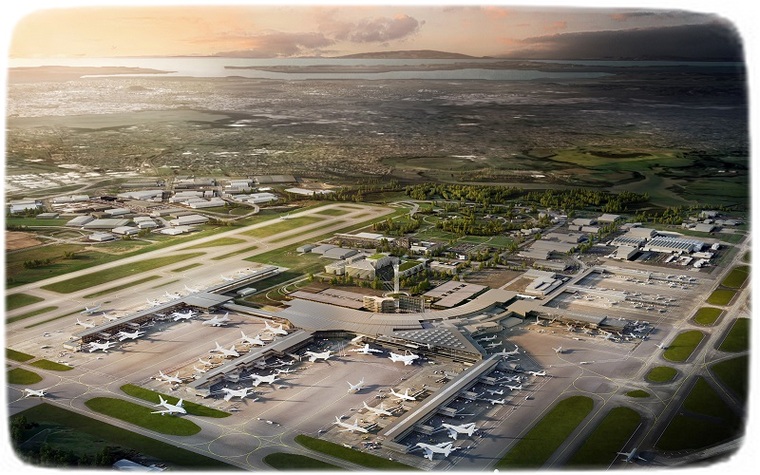 This includes regional lounges in Hamilton, Tauranga, Napier, New Plymouth, Palmerston North, Nelson, Queenstown, Dunedin and Invercargill. Air New Zealand General Manager Customer Experience Nikki Goodman says while it's great to welcome customers back to the airline's lounges, they'll be operating slightly differently to what people are used to. "In line with government regulations, our self-service buffet won't be available. Instead, customers will be required to be seated once they enter the lounge and there'll be table service with packaged snacks on offer, as well as beverages. "We know those travelling will be looking forward to once again being able to order a flat white before they fly and in lounges with a barista, customers will be given the choice of ordering through the Air New Zealand app, or through their server." The lounges will not be serving alcohol, but more food and alcohol options will be introduced in the coming weeks. There will also be a maximum of 100 people able to be in any lounge which would normally cater for more than that. Auckland Domestic lounge remains closed as it undergoes refurbishment. Valet parking also reopens today. BRITISH AIRWAYS 777 INTERIORS RECONFIGURED TO INCREASE CARGO CARRYING CAPABILITY 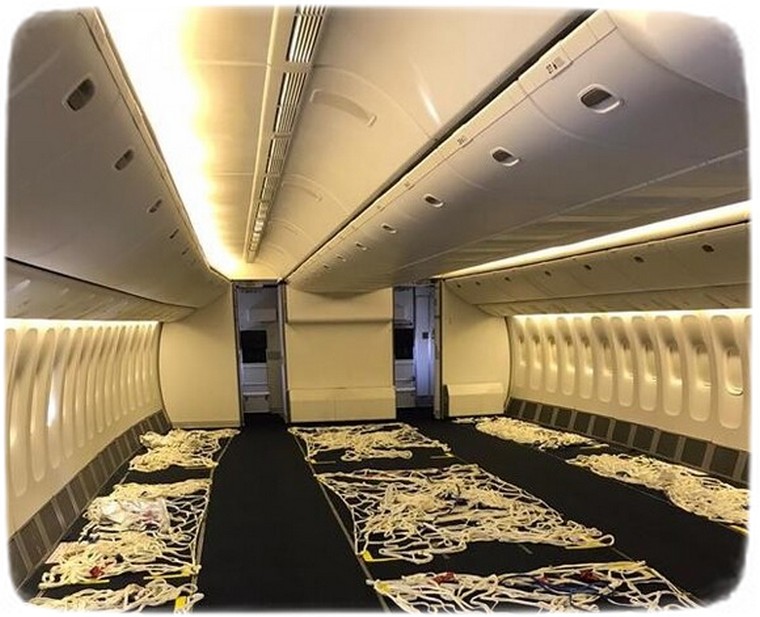 The first voyage of one of these aircraft in its new configuration will be to Beijing where it will collect PPE for the NHS. The aircraft will also be used to carry other essential goods like food and medicine to the UK where required, alongside regular commercial shipments. With demand for passenger travel still very low, working with IAG Cargo, British Airways is trying to use its grounded aircraft in creative ways to support in the global fight against Covid-19. In March, the airline began operating cargo-only services with no passengers, carrying cargo solely in the hold. In April, British Airways started carrying cargo on its seats, while these recent changes - removing all passenger seats and stripping the interiors - will mean these aircraft now have space for an extra 100m³ of cargo on each flight. John Cheetham, Chief Commercial Officer at IAG Cargo said: "During this time, we've worked with our customers to provide solutions that keep vital goods moving around the world. Solutions that include the opportunity to charter our planes. Together with British Airways, we've been pleased to boost the cargo capacity of these aircraft, supporting our customers, including the NHS, to transport more critical supplies. With their seats removed these 777s now have an additional 100m³ of space available for essential cargo." British Airways and its sister company IAG Cargo, continue to play an important role in moving supplies around the world. They have already operated more than 80 cargo charter flights carrying tonnes of PPE and ventilators for the NHS, in partnership with the UK government. This is alongside the airline's continued repatriation effort of UK residents and keeping other routes open for essential travel. 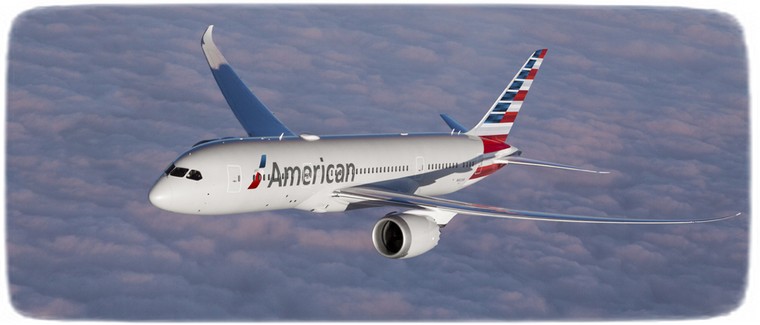 The gift was made possible by AAdvantage members who purchased miles during May after American announced it would donate 1 AAdvantage mile for every mile purchased, up to 10 million miles. AAdvantage members were committed to this cause and quickly reached the 10 million mile maximum. "We are so proud to partner with AAdvantage members and St. Jude Children's Research Hospital in their important work caring for children," said Bridget Blaise-Shamai, President of AAdvantage and American's Vice President of Loyalty and Customer Insights. "We are pleased to be contributing to the life-changing ways that St. Jude helps children and their families." "Since 2006, American Airlines and their generous customers have truly made a difference in the lives of the patients and families who come to St. Jude Children's Research Hospital from around the world," said Richard C. Shadyac Jr., President & CEO of ALSAC, the fundraising and awareness organization for St. Jude Children's Research Hospital. "Support from partners like American Airlines and its incredible AAdvantage members is especially needed today to brighten the future for kids tomorrow. We are humbled to accept this generous gift as it enables us to continue our foundational promise that families never receive a bill from St. Jude for treatment, travel, housing or food, because all they should worry about is helping their child live." 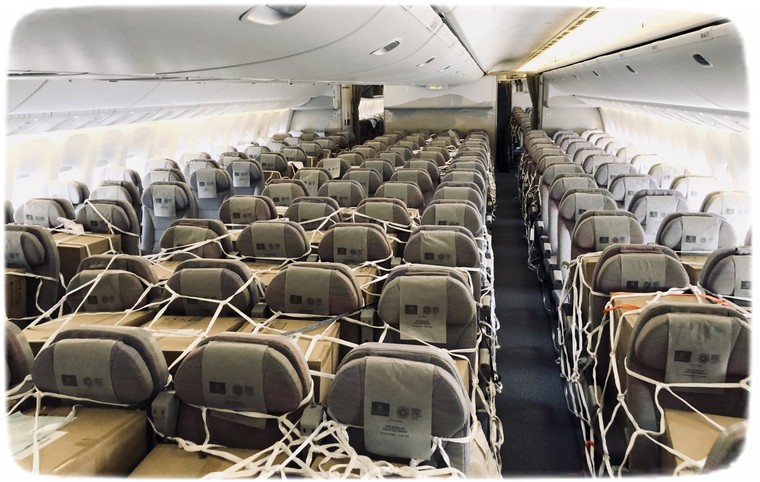 Since mid-April, Emirates SkyCargo has been transporting cargo on the seats and the overhead bins inside the passenger cabin of its Boeing 777-300ER aircraft. Placing cargo inside the aircraft cabin allows Emirates SkyCargo to transport more goods per flight, helping urgent cargo reach their destinations faster and allowing for more efficiency of flight operations. However, Emirates SkyCargo also places utmost importance on safety and in order to continue safe cargo operations even with cargo being loaded inside the aircraft cabin, the carrier has laid out strict rules on the kind of cargo that can be flown on the seats and the overhead bins. For example, cargo containing liquids and valuable cargo are some of the goods that are not allowed to be loaded on the passenger seats and overhead bins. Most perishables such as fruits and vegetables also have to still be loaded in the bellyhold of the aircraft. However, some exceptions include cut and preserved flowers and plants and dry and non-smelling fruits and vegetables which can be carefully packaged and loaded on seats or in overhead bins inside the aircraft. Any cargo that is loaded inside the passenger cabin has to be packaged inside a suitable external container such as a plastic or cardboard box in accordance with the latest regulations outlined by IATA. In addition, Emirates SkyCargo requires that all packaging must be able to contain any damage to the cargo and include an internal absorbent layer. Some of the other interesting and unexpected items that have been transported inside the cabin of the Emirates Boeing 777-300ER aircraft include garments and clothing, sporting goods, children's toys without batteries, empty soap dispensers, bottle caps for personal care products, dental supplies and even dry food and spices such as pine nuts and cardamom in some instances helping keep the global conveyor belt for goods and supplies running. Emirates SkyCargo continues to transport goods from more than 75 destinations across six continents, connecting people to the things they need most urgently, facilitating international trade and supporting local economies. HEATHROW AIRPORT PRIORITIZES CARGO FLIGHTS 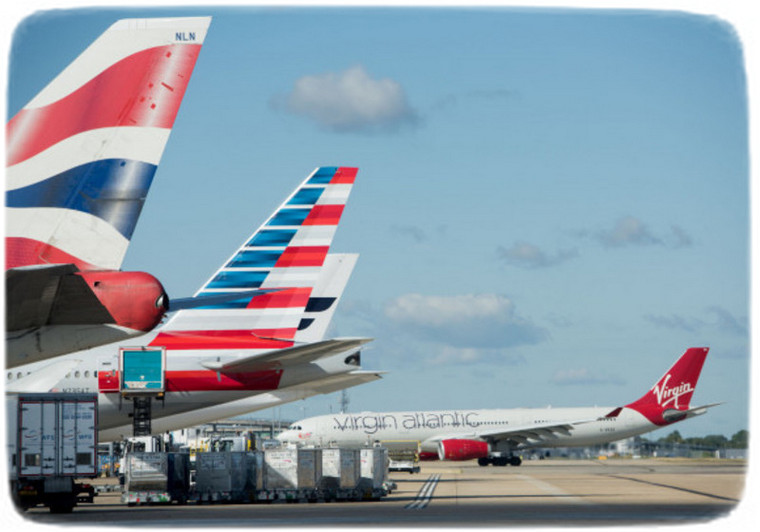 The airport said its busiest day for cargo only flights was on March 31, 2020 when it handled 38 dedicated cargo flights in a day. Normally, it only manages 6 cargo movements a day or 47 cargo flights a week. Heathrow Airport said it is well-placed to receive time-critical and temperature-sensitive medical supplies, such as ventilators, medicines and COVID-19 testing kits. "Heathrow continues to serve the nation by keeping vital supply lines open, and helping people get home. Now is the time to agree a common international standard for healthcare screening in airports so that when this crisis recedes, people can travel with confidence and we can get the British economy moving again," said Heathrow CEO John Holland-Kaye. Heathrow lost more than half of passengers it normally handles in a given month amid the global travel ban to prevent the spread of the virus that had since infected more than 2.3 million worldwide. It sees the downfall to continue with passenger demand in April projected to decrease by 90%. Heathrow moved to single runway operations on April 6th and says it will consolidate operations into Terminals 2 and 5 only in the coming weeks to reduce operating costs and protect long-term jobs. Glasgow-based airline Loganair flew from the UK's only hub airport for the first time in its 58-year history. The airline will be operating from Heathrow on an interim basis following the closure of London City Airport to maintain vital connections between the capital and the Isle of Man. Heathrow is Britain's only remaining air link to Belfast, with the airport serving as a vital airbridge to Northern Ireland during the pandemic.  |
                          |
 |
 |

Copyright © Pilot's Post PTY Ltd
The information, views and opinions by the authors contributing to Pilot's Post are not necessarily those of the editor or other writers at Pilot's Post.